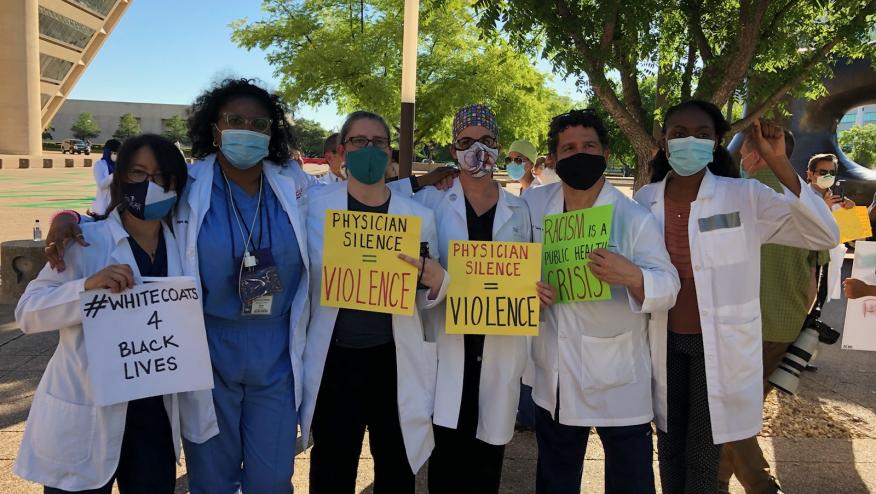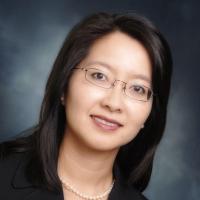Change from Within Save

I attended the #whitecoats4blacklives rally at Dallas City Hall a few weeks ago to support our black colleagues, patients, and friends. It was inspiring, humbling, and emotional. I encouraged other physicians to join me, posting on the Dallas Physician Facebook page that we need to lead by example for our community and our children to fight structural racism.
One black physician posed a very important point to my post, “What permanent changes will you make in your personal and professional lives as a result of this? Because not endorsing racism is not the same as not being complicit in it.”
I understood her point. We all knelt for 8 min and 46 seconds to acknowledge the injustice dealt to George Floyd, but how is this going to affect and change our society? Are we going through a motion because it is a popular thing to do, or do we really want to change?
Growing up as a minority in Enid, Oklahoma, I encountered racism myself. Other children made fun of how I looked: my slanted eyes, my flat nose, my olive skin. We were the only Asian family in town, and people were skeptical and afraid that we were going to spread communism. The children in my class chanted, “Chinese, Japanese, dirty knees, look at these” while stretching and slanting their eyelids to their temples. I was upset because my looks were not anything I could control.
My dad told me that people make fun of you because they are ignorant or scared; it is your job to educate them. I told my classmates about Vietnam. I told them about my family: my mom was a noble woman who was betrothed to a man from another noble family, but because the betrothed’s mother offended my grandmother, my grandmother proclaimed, “I would rather marry my daughter to the next pauper who knocks on my door than to your son!” My dad, a pauper, knocked on her door at the right time. I recounted what my family went through during the Vietnam War; how my dad had a bomb explode right by his face crossing a bridge, how we had to leave our 3-story home that had secret passageways and escape by boat. My brothers were so hungry during that voyage that when a seagull fell dead from the sky onto the boat, they argued about who could have the wing.
I worked to excel in school and kept a low profile because I did not want trouble. During residency, one of the attendings, trying to describe me to his colleagues, referred to me as the one with the “mongoloid” features. When I was looking for a job, I was low-balled with the wages they offered. I was given assignments no one wanted. I was insecure, unwilling to fight for myself; females were already making less than our male counterparts. But a minority female is even below that level.
I pondered the challenges in my life and the question posed on Facebook: where did racism stem, how does it permeate our society, and why does it persist? It boils down to this: it’s taught. We mimic behaviors of our mentors; the earliest mentors most of us have are our parents. If they tell us, “Don’t touch that, it will hurt you”, we believe that as a fact. Similarly, if parents are prejudiced against black people or other races, those same biases are passed onto their children.
As physicians, we need to serve as examples of how to speak, act, and behave whether or not we see patients, teach students and residents, or serve on committees; people emulate us. We are the authorities on health. On June 2, 2020, the American Pediatrics Infectious Disease Society issued a jarring statement, “…structural racism is more harmful to the health and well-being of children than infectious diseases, including COVID-19.” I hope that other medical societies will follow suit and make a similar statement, but how can we individually change the bias ingrained in our society?
This is what I believe in and am committed to do:
1. Teach my children that racism is not acceptable
2. Vote
3. Recognize my own implicit bias
4. Speak out when I see injustices
By far, the first two are the most important to me. I invite you to reflect on what permanent changes you will make in your personal and professional lives as a result of this and share it.
Join The Discussion
Kudos. Thank you Dr Dao
Thanks for your personal comments. I am a third generation Asian American who has had similar experiences. There have been subtle events such as my department "forgetting" to submit paperwork for a promotion and then not doing an accelerated promotion in the next cycle. Or being "disrespected" during committee meetings. I only remained as a university faculty because of my Division chair who was and is immensely supportive. My children have experienced discrimination in our university town and have moved away. I am hoping that equality will be given more than lip service.










If you are a health practitioner, you may Login/Register to comment.
Due to the nature of these comment forums, only health practitioners are allowed to comment at this time.